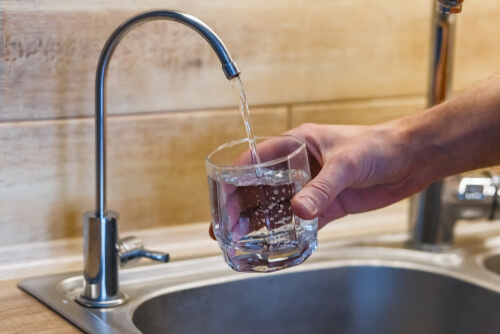
Water from the tap runs through an entire filtration process before making its way through your sink faucet. Even so, microscopic debris, additives, and undesirable remnants can make their way into your drinking water.
Installing your own filtration system can help, and a charcoal water filter is one of the best options. Here is how it works and why you will benefit from using one in your home.
Charcoal Vs Activated Charcoal Water Filtration
Regular charcoal, like that used for grilling, contains toxins unfit for human consumption. Activated charcoal contains natural elements and is processed at an incredibly high degree of heat to produce an especially porous result.
The porous texture contains a negative electrical charge, which causes it to attract molecules that are positively charged, such as toxins. The process of adsorption, unlike absorption, is what allows chemicals binding to occur so that toxins are attracted to the charcoal and then held within the porous cavities until the charcoal becomes full and is expelled.
Health Benefits of a Charcoal Water Filter
Activated charcoal has numerous health benefits when ingested by humans, such as whitening teeth and detoxifying the gut. The porous composition of it binds toxins and other compounds to itself. Then both the activated charcoal and the bound toxins are released with the other waste your body naturally expels.
It has been used effectively in medicine for years to counteract poisoning and drug or alcohol overdose. Its efficacy in human detoxification translates into charcoal filters for water.
Health Benefits of an Activated Charcoal Water Filter
A charcoal water filter works the same way as activated charcoal in the body. Charcoal can be a solid piece or it can be smaller granules. The water from your house pipes runs through the filtration unit before exiting through the faucet where extra additives, toxins, chlorine, and other chemical compounds that weren’t caught in earlier processing, are captured.
There are many benefits to using an activated charcoal filter. Here are three:
Water Tastes Better
Chlorine and other chemicals are added to city water to kill bacteria and other pathogens that cause a variety of illnesses. This is an intentional treatment to benefit public health; however, they can give tap water a disagreeable taste and odor.
Many people find this unpleasant and do not like to drink tap water. Charcoal filter water attracts the chlorine and other additives and holds them within its structure so that your drinking water comes out clean and tasting and smelling good.
Healthy Minerals Remain Through Filtration
There are healthy ions and minerals in tap water that are good for the body, and it is important that these don’t get picked up in the filtration process. Due to the chemical composition of the activated charcoal, the impurities and toxins are filtered out, but the healthy components remain. Sometimes minerals like calcium and iron are even added.
Charcoal Filters Are Easy To Maintain
As charcoal binds the toxins and unwanted materials in water over time, it becomes full at some point. Therefore, you will need to change the filter on occasion to keep it functioning thoroughly. A good estimate would be to change the filter approximately every six months.
Depending on where you live and your water quality, you may need to increase or decrease the frequency with which you change the filter, but six months is a good average. Fortunately, charcoal filters are fairly inexpensive compared with other filtration systems.
Contact Aqua Science For Your Water Filtration Needs
Now you have learned the difference between regular charcoal and activated charcoal. You have read how it is produced, how it works and the various benefits derived from its use.
You have also gained an understanding of how an activated charcoal water filter functions to provide you with clean, great-tasting, natural water. If clean, great-tasting, natural water is something you would like in your home, contact us for a free estimate.
Call (480) 454-3700
Image Credit: Shutterstock/gorodphoto

